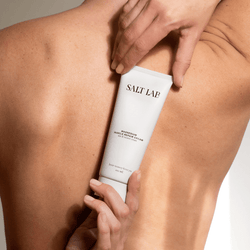Hi Shereen! Thank you so much for collaborating with us. Can you tell us a bit about yourself and your journey into becoming a Certified Sleep Consultant?
I became a sleep consultant because my first-born child was an awful sleeper. He catnapped, woke excessively overnight and could not settle to sleep without a high level of support. At the time I needed professional help, but the only option with sleep consultants was to implement a cry-based method. This did not reflect my parenting style or my strong attachment to my child, so I completed my own studies to become a sleep consultant! During my training, I noticed they placed a high focus on using controlled crying because it was a quick fix. Again, I didn’t want to encourage my clients to use this approach if it’s an approach I wouldn’t even use with my own child. As I studied, I furthered my thoughts around the fact that sleep is a natural, biological process and it should be easily achieved; our bodies should be able to sleep on auto-pilot. This led me on a path of exploring interruptions to the biological sleeping process. Over my 8 years of practising, I have placed a primary focus on exploring those underlying issues interrupting a child’s ability to achieve sleep, assessing physiological, medical and nutritional factors.

What is the most common sleep challenge parents face with young children?
I'v found that the most common sleep challenges parents face are blocks of sleep that are shorter than the typical sleep cycle. This could mean persistent and chronic early morning rising, delayed sleep onset and requiring a high level of assistance to achieve sleep.
Although I have an approach to sleep which reminds parents that their child’s sleep issues are not the fault of the parents, one common parental input that impacts their child’s sleep is over assistance and responsibility. Many parents place a level of responsibility on their child falling asleep, so they will over assist their child, aiding with the sleep onset. This can often overstimulate children, and interrupt their ability to self-settle. This can cause longer settling periods and exacerbating crying through the bedtime process.

From my perspective, a bedtime routine bears no real success on bedtime and night sleep outcomes. The steps parents undertake with their child to prepare for bed, are complimentary to any bedtime. I usually just encourage some quiet one on one time before bed and no screens 2 hours prior to sleep onset. The increased ability for children to sleep better comes from well-balanced day sleep and sufficient nutritional intake.
Through my practicing, I noticed a pattern in children who had nutritional deficiencies and how they impacted sleep. A child naturopath noticed my practicing model and reach out to me, and we have collaborated over the last 5 years!
My two most discussed nutrients are magnesium and iron. Iron and magnesium deficiencies impact a child’s ability to sleep well. Magnesium is essential for promoting relaxation, regulating neurotransmitters and supporting the circadian rhythm. It enhances the conversion of tryptophan to serotonin and helps to regulate the body’s production of melatonin. It also has a calming effect on the nervous system, acts as a natural muscle relaxant, helping ease tension and promote physical relaxation. Additionally, it helps modulate the body’s stress response, lowering cortisol levels and reducing feelings of anxiety, promoting a more relaxed state conducive to sleep.

We’ve only used it one night, which was last night. My children are 10 years old (boy) and 7 years old (girl). Of course, they are amazing sleepers but my son did mention this morning that the spray helped him fall asleep faster! ☺
I love natural products which support a child’s sleep onset, sleep quality and sleep latency. I am a natural, holistic consultant (and parent – we room share and home school) and prefer to focus on natural products which address root issues, rather than physical sleep aids. I have a huge focus on holistic practicing and would love to recommend magnesium products from Salt Lab to my clients.
















